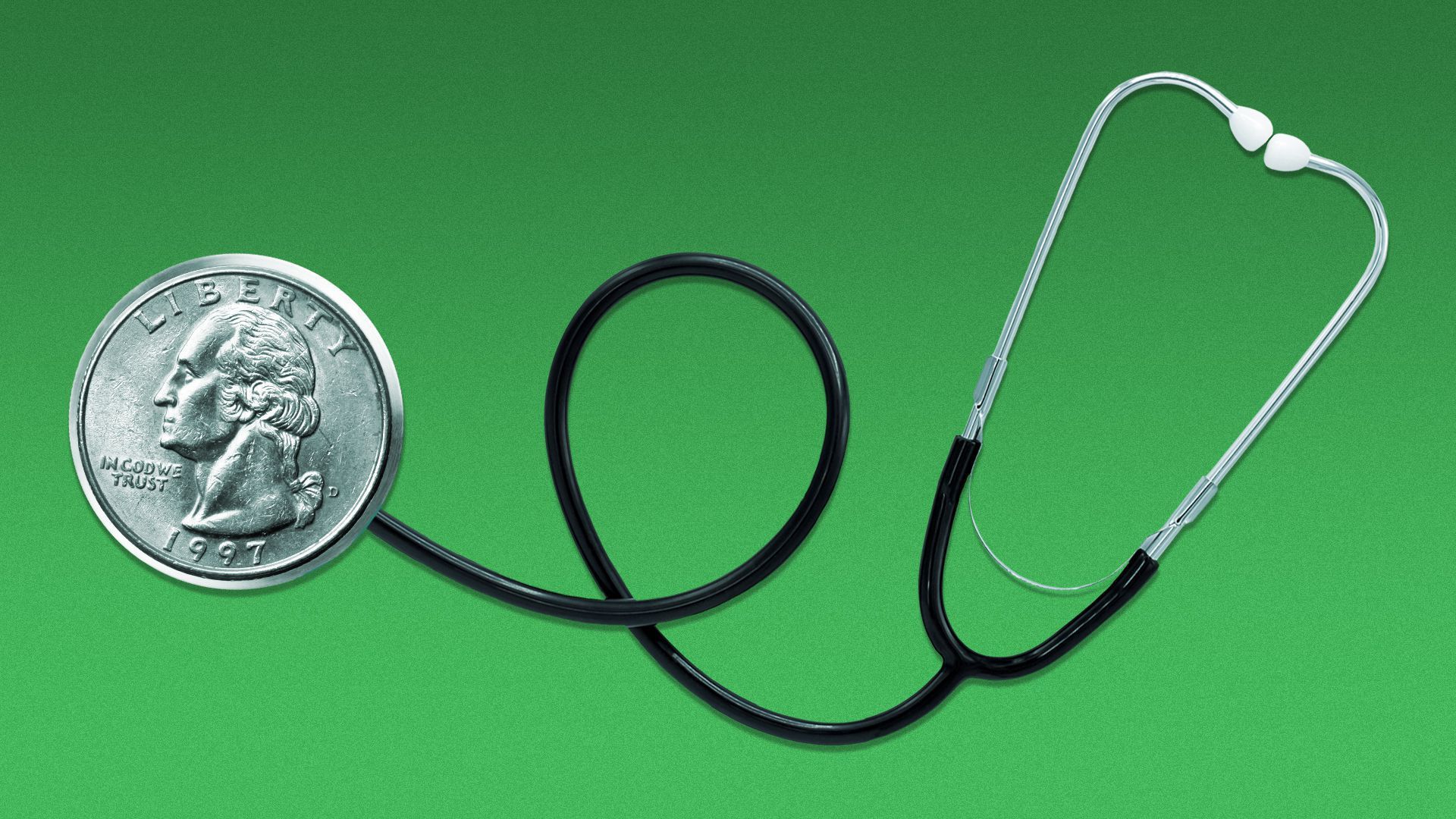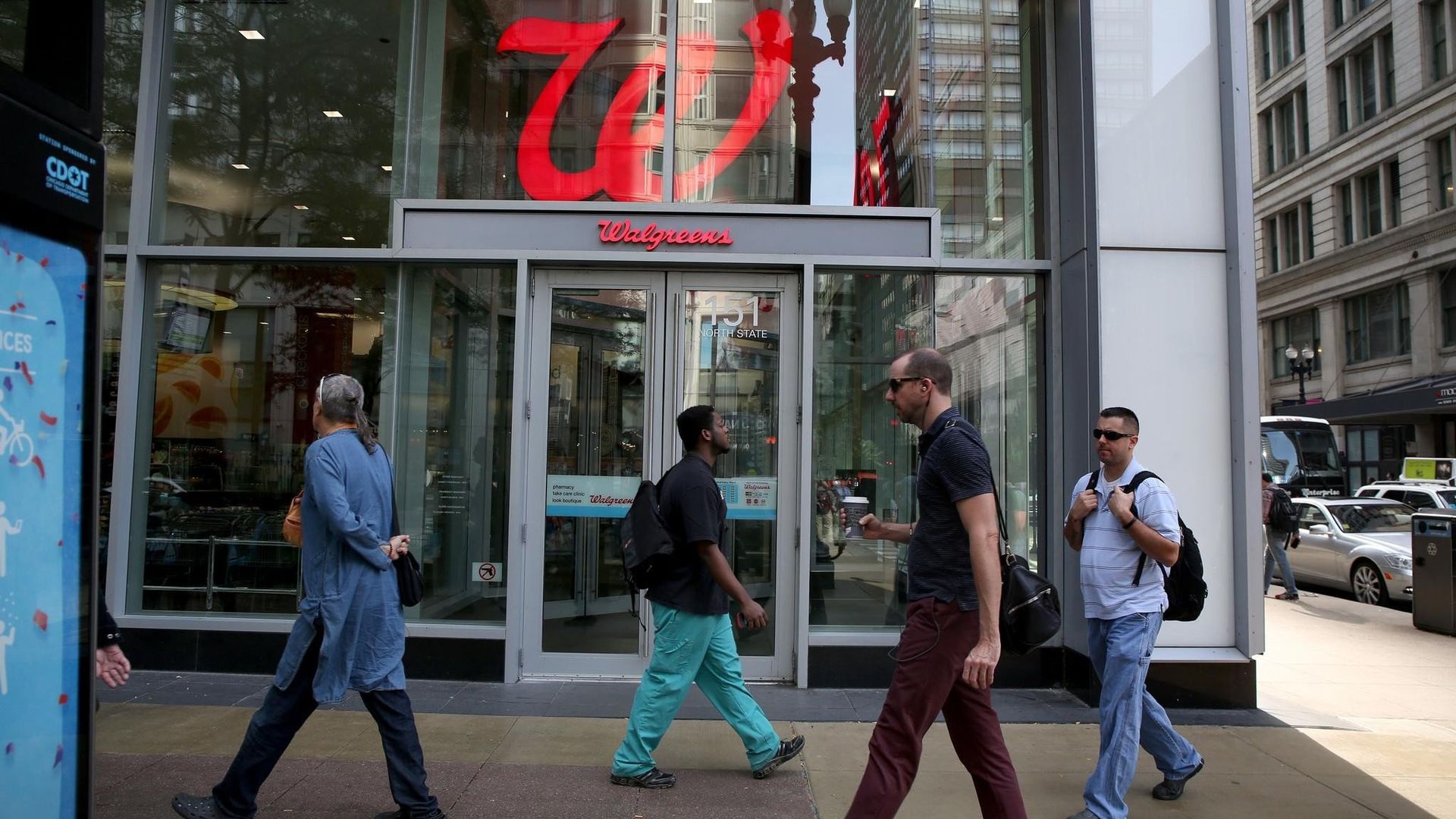| | | | | | | Presented By PhRMA | | | | Axios Vitals | | By Tina Reed · Nov 08, 2022 | | 🇺🇸 Happy Election Day, Vitals readers. Today's newsletter is 918 words or a 3.5 minute read. On tap today: The Supreme Court will hear oral arguments today in a case that takes up Medicaid recipients' ability to sue if they think their rights are violated. - The outcome could also have ramifications for the Children's Health Insurance Program, the Supplemental Nutrition Assistance Program, Head Start and other programs, Democratic leaders have warned.
| | | | | | 1 big thing: Abortion, Medicaid fights highlight state ballot tests |  | | | Illustration: Brendan Lynch/Axios | | | | While inflation and the economy have been foremost on voters' minds across the nation this election cycle, some of the most high-profile health care battles are being decided at the state level on Tuesday. Driving the news: Voters in Michigan, Kentucky, Vermont, California and Montana are weighing abortion ballot questions that drive home how key reproductive rights battles post-Roe are being waged outside the federal realm. - Elsewhere, there are measures dealing with Medicaid expansion, the regulation of the dialysis industry, and even whether access to health care is a legally enforceable right.
The big picture: The biggest outcome for health care remains whether Republicans retake one or both houses of Congress. - But the statewide votes reinforce how many key decisions are devolving to governors, legislatures and state regulators.
Here's what we're watching: Abortion rights: Voters in California, Michigan and Vermont will consider whether to amend their state constitutions to protect the right to abortions. Medicaid expansion: South Dakota, one of a dozen Republican-led holdout states that haven't expanded their Medicaid programs, will put the question to voters. Health care as a right: Voters in Oregon will vote on whether or not to make the state the first to enshrine a right to health care, the Associated Press reports. - If passed, the state would have an obligation to ensure residents have access to "cost-effective, clinically appropriate and affordable health care."
Dialysis regulations: Voters in California will consider whether or not to approve tighter regulations for the dialysis industry, such as a requirement to have an on-site physician. Go deeper. |     | | | | | | 2. Changing how CMS pays for specialty care |  | | | Illustration: Shoshana Gordon/Axios | | | | The Biden administration is getting serious about transforming Medicare payments for specialty care, Axios' Maya Goldman writes. - Some doctors will be required to participate in programs that pay fixed amounts for care connected to certain surgeries and procedures.
Why it matters: The Centers for Medicare and Medicaid Services says it has struggled to control health spending and boost the quality of care through steps like coordinating primary and specialty care. Driving the news: The CMS Innovation Center, which tests new ways to pay providers, released a strategy report for specialty care payment experiments on Monday. The center also wants to create a new mandatory payment model built around "bundled" payments for episodes of care, to incentivize providers to manage their spending. - Medicare scaled back bundled payment plans for bypass surgery, hip procedures and joint replacements in 2017 after providers complained about the mandatory nature of the programs. CMS has begun a mandatory model for end-stage renal disease care since then.
What's next: The Innovation Center also announced plans to publish a roadmap on aligning value-based payment efforts across different federal payers, and to continue making its payment experiments more equitable. Share this story. |     | | | | | | 3. Walgreens makes its latest care delivery move |  | | | Photo: Nancy Stone/Chicago Tribune/Tribune News Service via Getty Images | | | | The $9 billion acquisition of Summit Health by Walgreens-owned VillageMD heats up competition among national retailers to take the lead in primary and home care, Axios' Arielle Dreher writes. Context: In 2022 alone, Amazon, CVS, and now Walgreens have made major investments in health care delivery models. Zoom in: With this deal, VillageMD is placing its bet on the importance of specialty care, Axios' Sarah Pringle writes. - With the Summit Health acquisition, VillageMD will expand its footprint in the Northeast and in Oregon. The two groups will have 680 provider locations in 26 markets.
Zoom out: For Walgreens Boots Alliance, which posted its fourth-quarter results last month, VillageMD was the largest driver of the company's sales growth in the past year in the United States, executives told investors. - "If you want to continue to be successful in delivering care in a value-based care model, you have to be successful managing the specialty spend and the other ancillary spend, like lab and imaging," VillageMD CEO Tim Barry told Axios' Sarah Pringle and Claire Rychlewski.
|     | | | | | | A message from PhRMA | | Americans want policy reforms that improve their insurance | | |  | | | | Did you know 39% of insured Americans say they don't understand what's covered by their insurance? Health insurance coverage should be predictable and transparent, and insured Americans agree. Learn more from PhRMA's latest Patient Experience Survey report. | | | | | | 4. Dementia prevalence dropped, RAND study finds |  | | | Illustration: Gabriella Turrisi/Axios | | | | The prevalence of dementia dropped by nearly one third in people older than 65 from 2000 to 2016, according to a new study from the RAND Corporation. Driving the news: The study in the Proceedings of the National Academy of Sciences found the age-adjusted prevalence of dementia fell to 8.5% of people over age 65 in 2016, down from 12.2% in 2000. Between the lines: Researchers say more work needs to be done to understand what's behind the decline and the impact of health disparities on dementia rates. But they say the decline may be attributed to better education about improved health behaviors. - "It is also plausible that other behavior factors, such as smoking [cessation], cognitive activities, social activities, etc., played a role," Péter Hudomiet, an economist at RAND, told UPI about the study's findings.
The intrigue: In some positive Alzheimer's news also published Monday, another study found natural compounds in beer hops may help protect against the disease. |     | | | | | | 5. Catch up quick | | 🏥 Cross-market hospital consolidation is on the rise and understudied, a study out Monday shows. (Fierce Healthcare) 🩸 Lab-grown blood was given to humans in a world-first trial aimed at combatting rare disorders. (CNBC) 👀 Pharma helped finance committees that support election deniers. (STAT) 💊 The Defense Department's health plan Tricare cut its pharmacy network by nearly 15,000 outlets. (KHN) |     | | | | | | A message from PhRMA | | How insured Americans navigate unclear insurance coverage | | |  | | | | According to new findings, insured Americans favor policy solutions that improve their ability to navigate and access their care while lowering their out-of-pocket costs. An example: Tackling the barriers introduced by insurers and middlemen like pharmacy benefit managers. Read more. | | | | Thanks for reading, and thanks to senior editor Adriel Bettelheim and copy editor Nick Aspinwall for the edits. Did someone forward this email to you? Here's how to sign up. |  | | Why stop here? Let's go Pro. | | | | | | Axios thanks our partners for supporting our newsletters. If you're interested in advertising, learn more here.
Sponsorship has no influence on editorial content. Axios, 3100 Clarendon Blvd, Arlington VA 22201 | | | You received this email because you signed up for newsletters from Axios.
Change your preferences or unsubscribe here. | | | Was this email forwarded to you?
Sign up now to get Axios in your inbox. | | | | Follow Axios on social media:    | | | | | |
Post a Comment
0Comments